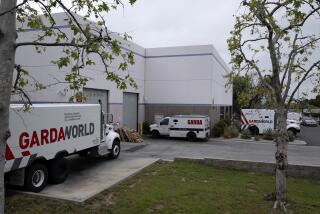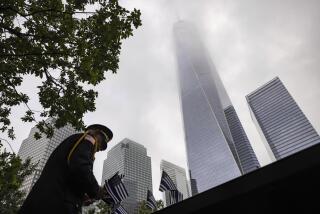Closed Offices Reopen, but Concerns Remain
- Share via
U.S. banks tried to return to business-as-usual Wednesday, reopening offices in high-rises, lifting withdrawal limits and completing transactions held up by Tuesday’s disastrous attacks.
But it was a struggle for some institutions, as bank employees were particularly jolted by the destruction of the World Trade Center and the possible loss of business associates and friends. What’s more, new fears about the economy--and the effects a downturn would have on banks--clouded the outlook for the industry.
Before the attacks, “my thinking was that this is the time to buy financial service stocks,” Morningstar analyst Harry Milling said. “Now I’m not so sure.”
Among Milling’s worries are a higher chance of defaults on corporate loans at giants such as Citibank, J.P. Morgan and Bank of America. Even retail powerhouses such as Wells Fargo could be hurt if defaults on single-family mortgages, which so far have been modest, should start to rise sharply, he said.
“The theme here is uncertainty,” Milling said. “What [interest rate] actions will the Fed take and what effect will they have? What happens to crude oil prices if an OPEC nation is involved in harboring terrorists? Will consumer spending hold up?”
On Wednesday, local bank branches were preoccupied with restoring full operations and allaying customer concerns some had expressed about risks to their deposits.
Most banks remained open Tuesday, but some were unable to wire funds because of troubles at banks that had electronic payment operations at the World Trade Center. But the FedWire and the Clearing House Interbank Payment System, wire systems used to transfer money and securities, were running smoothly Wednesday, said George Thomas, a senior vice president for the Clearing House system in New York.
Bankers and analysts said the Federal Reserve had successfully provided funds where needed, allowing banks to increase supplies of cash at branches and ATMs. The Fed declined to disclose how much extra cash it had provided, saying only that demand was “somewhat higher than normal.”
Expecting heavy demand, Washington Mutual limited withdrawals to $2,500 per customer Tuesday, while Wells Fargo imposed a limit of $2,000. Both lifted the limits Wednesday, saying they weren’t needed.
Mary Trigg, a spokeswoman for Wells Fargo, said the bank had closed several branches in downtown Los Angeles and on the city’s Westside after the attacks, moving extra cash to neighboring branches to accommodate increased demand.
“All our branches are open again, and it appears to be business as usual,” she said.
But not quite. Like other banks, Wells Fargo was dealing with employees personally affected by the terrorist attacks. Trigg said she had heard of at least six employees who had relatives at the Trade Center, the Pentagon or on the hijacked planes.
Wells Fargo said it activated a crisis intervention team of social workers and psychologists, used in the past to counsel employees terrorized by bank robbers. “There are so many people who have colleagues working there and feel their pain,” Trigg said. “It’s just heart-wrenching for everyone.”
Wells Fargo said all of its New York employees were safe. Trigg said the bank was lucky because it had no offices at the scene of the attack.
But that wasn’t the case for many other banks, brokerages and other financial firms that dominated the World Trade Center, where about 6,000 employees still have not been accounted for, authorities said.
Even workers at small community banks and financial institutions feared they had lost someone. Securities firms Keefe, Bruyette & Woods Inc. and Sandler O’Neill & Partners, both based at the World Trade Center, had helped community banks throughout California arrange mergers and raise capital, said Gary S. Findley, a banking consultant in Anaheim.
“We hope they didn’t lose many people,” said Findley, who consults for about 70 small banks. “This is a very traumatic experience for many of my clients.”
Bankers said customers were handling the situation well. There were no signs of panic the day after some customers were rushing to withdraw funds.
Banking consultant Edward Carpenter said people with memories of the Great Depression, before the federal government insured bank deposits, were mainly responsible for an increase in cash withdrawn Tuesday. But the increase was still modest, he said.
PriVest, a small community bank in Santa Ana, locked its front door for much of Tuesday as a precaution but reopened it Wednesday. Several wire transfers of money and requests for international letters of credit had been held up Tuesday but were put through Wednesday, said Senior Vice President David Murray.
Murray recalled how one middle-aged woman Tuesday had been urged by her father to take all her money out. But after talking matters over, he said, she withdrew only a small percentage of her sizable deposits as a precaution.
“It was not really a panic issue,” Murray said. “She knew her money was safe. It was more an issue of what happens if the banking system is shut down and I need cash.”
Rudy A. DePorter, vice president for private client services at Northern Trust Bank in Newport Beach, said Tuesday was eerie. “The phones just didn’t ring,” he said.
Bloomberg News was used in compiling this report.
More to Read
Inside the business of entertainment
The Wide Shot brings you news, analysis and insights on everything from streaming wars to production — and what it all means for the future.
You may occasionally receive promotional content from the Los Angeles Times.











